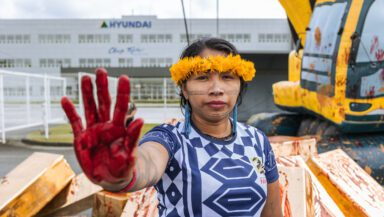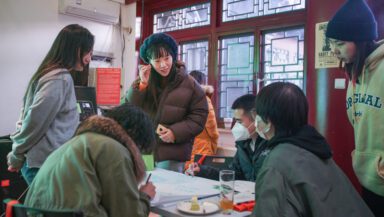Tesco’s complicity in deforestation and deliberately-set fires in the Amazon and across Brazil is the subject of Greenpeace UK’s new film, Tesco’s Burning Secret, released today.
Despite Tesco claiming to have met its deforestation targets, its meat is not deforestation-free. It buys British chicken and pork from suppliers owned by notorious Amazon rainforest-destroyer, JBS, and continues to sell more soya-fed, factory-farmed meat than any other UK supermarket. Tesco’s soya-fed meat has been strongly linked to deforestation and fires in the Brazilian Cerrado.
Tesco’s Burning Secret opens with a shot of Tesco’s headquarters surrounded by flames with the question ‘Do you know Tesco’s burning secret?’ The blue dotted line from the supermarket’s logo then breaks free to lead the viewer on a behind-the-scenes journey from Tesco’s shop front to Brazil’s forest floor.
As trees fall and forests burn all around, we see Tesco’s management shake hands and sign a deal with Brazil’s forest destroyers. Next we see soya grown on deforested land shipped to the UK where it’s fed to factory farmed chickens and pigs. The meat produced is finally shown lining the shelves of Tesco, clinical and shrink wrapped, a world away from the horror created to produce it.
Elena Polisano, Senior Forest Campaigner at Greenpeace UK, said:
“Tesco often talks about its plans to buy soya ‘only from deforestation-free areas’ by 2025 but it’s pure greenwash. These areas don’t even exist and talks to establish them collapsed in 2019.
“It also defends its contract with companies owned by the notorious forest-destroyer JBS, claiming it can hold the company to account better as a customer but that’s not working. JBS recently announced it would accept deforestation in its supply chain for another 14 years.
“With the climate crisis worsening by the day and the Brazilian government intent on weakening environmental legislation, it’s time Tesco took a proper stand. It must drop forest destroyers immediately and reduce the industrial meat sold from its shelves from now.”
The animation was made in collaboration with Chicken Fruit Studio with music specially composed and recorded by Reeder.
Lindsey Williams, Producer at Chicken Fruit Studio, said:
“We are a Carbon Literate studio (and human beings who live on Earth), so the needless destruction of our climate and planet is an important issue for us. The opportunity to make an animation that has the potential to make a difference was one we couldn’t pass up.
“We used a combination of 3D objects, paper cut-outs, print textures and photographs in a muted palette to reflect the dark subject matter. The camera pans through a series of still moments, capturing each step and focusing on the fact that being a part of this destruction is a conscious choice made by Tesco management.”
Fires in the Amazon, Cerrado and the Pantanal wetlands are not natural disasters. Huge areas of these precious forests are slashed and burned every year to make way for cattle ranches and to grow soya for animal feed.
Brits eat twice as much meat and dairy as the global average [1] and Tesco uses one sixth of the UK’s soya, 99% of it in its meat and dairy supply chain. [2]
90% of the soya imported to Europe is used for animal feed [3] and two thirds of the UK’s soya is imported from South America, where it is a leading cause of deforestation. [4]
Download the film and stills from it here: https://media.greenpeace.org/shoot/27MDHUWS7WFJ
Read more in our blog here: https://www.greenpeace.org.uk/news/watch-tescos-burning-secret/
ENDS
For more information on Greenpeace UK’s campaign to end deforestation, contact press.uk@greenpeace.org
For more information on the creative and production process, contact lindsey@chickenfruit.studio
Notes to editors
[1] FAOSTAT
[3] 90% of soya consumed in Europe is for animal feed (pg 3): http://www.efeca.com/wp-content/uploads/2018/11/UK-RT-on-Sustainable-Soya-baseline-report-Oct-2018.pdf
[4] Two thirds of the soya imported into the UK comes from South America – Argentina, Brazil and Paraguay, where soya expansion is a leading cause of deforestation (pg 68): https://www.idhsustainabletrade.com/uploaded/2019/04/European-Soy-Monitor.pdf



